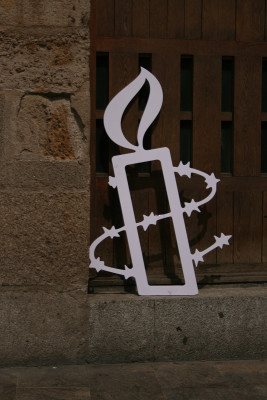
Boston University’s Student Activities Office denied the request of BU’s Amnesty International chapter to reinstate itself as an official student group, rejecting its application on Oct. 8 in an email, said current BU Amnesty President Sofie Engen.
Amnesty International is a nongovernmental organization that focuses on issues of human rights and social justice. BU has not had an official chapter for the past four years.
Engen, a sophomore in the College of Arts and Sciences, said she was surprised by this. Wanting to get more involved in humanitarian work, Engen said, she and her executive board members filed an application to SAO in order to bring back BU Amnesty.
“BU prides itself for being a big activist school, yet there is no platform for students to get involved into activism,” she said, “The national regional conference for Amnesty International is actually happening at BU this year, so they are very disappointed that we did not get accepted because we are trying to host an event for the national conference, which is really hard because we cannot book a space at BU without being affiliated with SAO.”
Andres Muñoz, an SAO assistant in charge of approving organization applications, stated in the Oct. 8 email that SAO does not think BU Amnesty’s goal is clear enough.
“There were numerous considerations taken but primarily your group did not have a specific programming plan,” Muñoz said.
Muñoz also stated that BU Amnesty can either work together with existing organizations or reapply in the spring, but “at this time, your organization is not eligible for an appeal.”
Muñoz was unreachable for comment.
Jose Godoy, a member of both the SAO Student Involvement Board and BU Amnesty, said that the process of granting approval to an official student group under BU is “exhausting,” opening room for mistakes.
“For Sofie’s group, they were assigned a time to meet for presentation, but couldn’t make it because she had an exam,” said Godoy, a junior in the Questrom School of Business. “Because she couldn’t make it, therefore she couldn’t apply at any other time, so she was in a way denied without a second chance.”
Although BU Amnesty was disappointed by SAO’s decision, Engen said, they are prepared to still establish a considerable presence on campus and continue producing initiatives by increasing awareness.
“[We will be] having fundraisers, different movie screenings, different talks, getting students involved with human right activism, just providing a platform for students to get involved with activism,” Engen said. “BU has such a global presence that we could really make a difference and help students [through] Amnesty International”
Although SAO did not recognize BU Amnesty as an official BU-affiliated organization, BU Amnesty has full support from the national AI organization, said Cynthia Gabriel Walsh, field organizer at the Amnesty International Northeast Regional Office.
“Officially recognized chapters are guaranteed the right to vote, which gives them a seat at the decision making table,” Walsh said. “We also provide student groups with training, improve their ability to organize, to fundraise, to also really give people the opportunity to learn about human right issues. We also provide hard-core materials, so that students can go out to the community and to educate the community.”
Walsh added that she was also disappointed about SAO’s decision of denying BU Amnesty’s application.
“On Nov. 7 we will be hosting our 38th regional conference, which is the day of workshops, inspirational speakers and a showcase of direct actions that [have] taken place. And Boston University has been the host of these conferences for at least 25 years. So having a strong, active BU group is very important to us,” she said, “I would have to find out the reasons [of the application’s denial] but you know, this is disappointing.”
AI currently has chapters at many widely recognized universities and high schools in the Greater Boston Area, including Harvard University, the Massachusetts Institute of Technology, Boston College, Tufts University, Wellesley College and the Boston Latin School, said Walsh.
Several students said they do not know about AI and its goals but agreed that there are many issues they can help address.
Ani Keshishian, a junior in CAS, said BU Amnesty has the capability to spark conversations and increase students’ recognition towards current international crises.
“I don’t know exactly what group [BU Amnesty] focuses on, but I know they could work on the huge refugee crisis in Syria,” she said. “You can do either donations, or just raise awareness about this huge issue.”
Pengcheng Xu, a senior in CAS, said he would like organizations such as BU Amnesty to address minority and race issues prevalent in various communities both in Boston and the country.
“There is some racism basically everywhere,” he said. “[BU Amnesty] can also, I guess, talk about how some Chinese labor don’t have free legal support, both legal immigrants and illegal immigrants.”
Reilly Jamison, a freshman in Questrom, said BU Amnesty can help countries that are experiencing severe economical, social and political turbulence.
“[BU Amnesty] should focus on a lot of issues in the Middle East, in the poorer countries over there. Issues like helping the refugees,” he said. “Boston is such a wealthy area, and we have a lot of money in this area that could be used to fund programs that helps people over there.”
























































































































Cameron • Oct 16, 2015 at 10:36 am
I founded the student chapter of Amnesty International at my university in Charlotte, NC. We did not have any issue whatsoever and our school does not have a history of student activism and our student government is traditionally very conservative.
I don’t think this story is giving the full story. After reading this piece I am left wondering if the AI student group did their due diligence when submitting their documentation for their application and then missing the meeting to defend their application.
In short it seems like a disorganized group of students at BU and less of an issue with the student government.